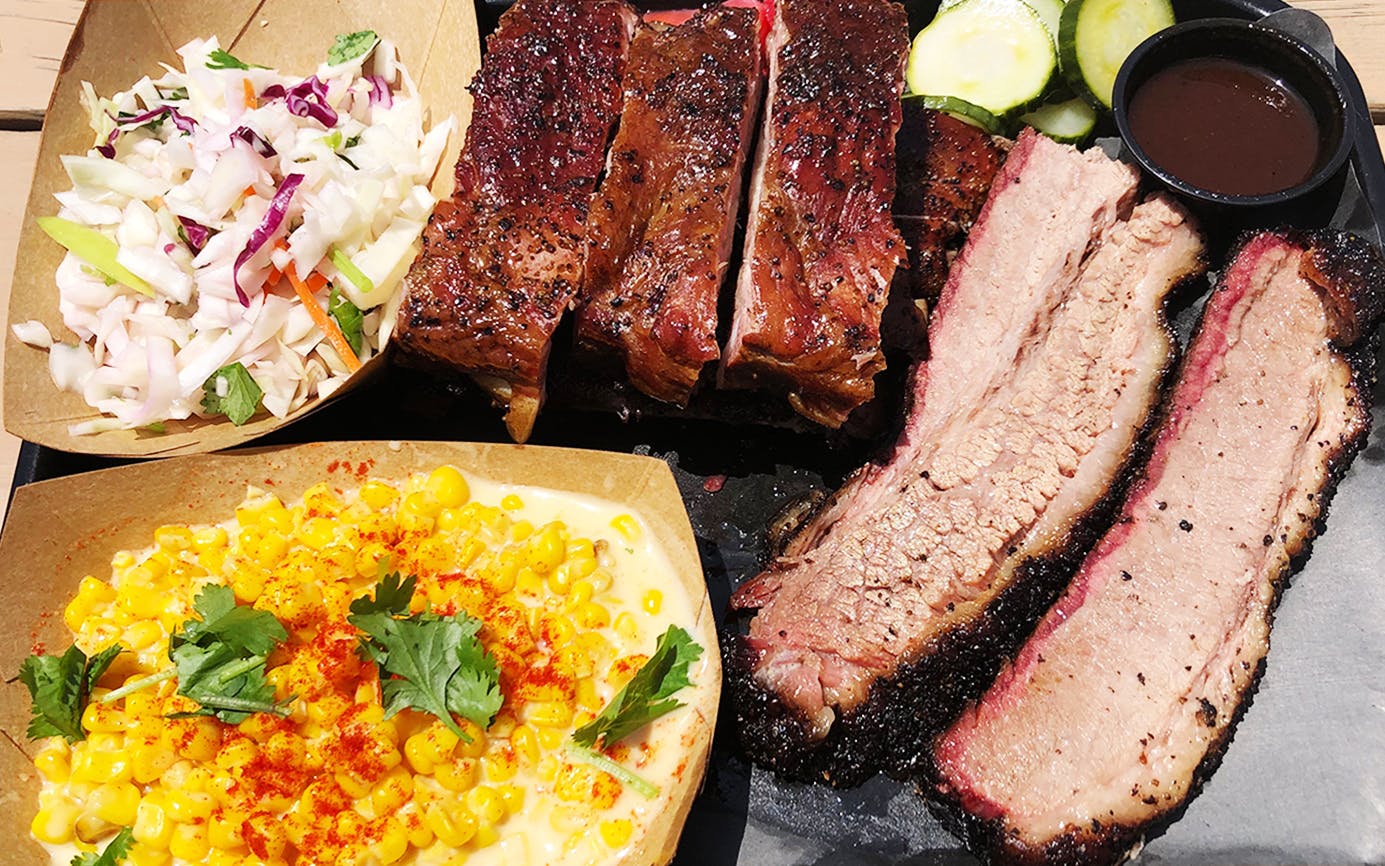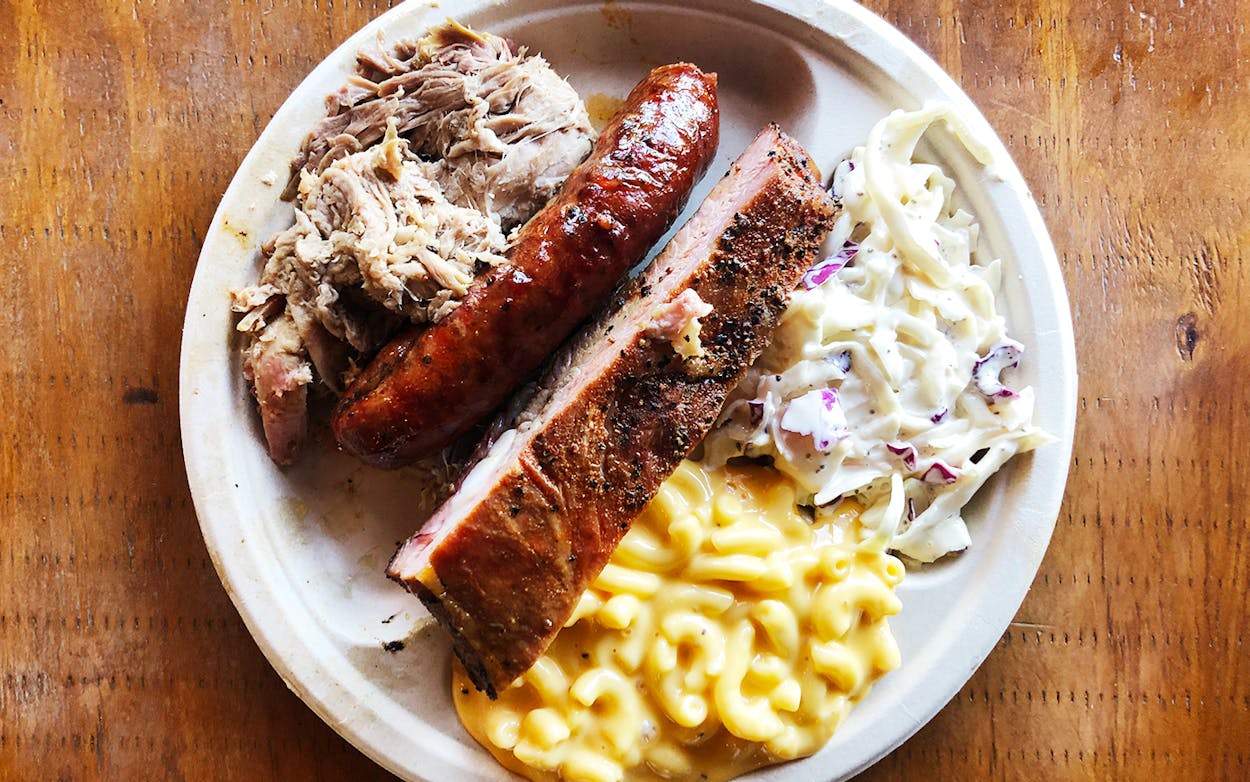Texas barbecue is flaunting its dominance in some unexpected places these days. During a road trip through portions of Pennsylvania and Wisconsin, I didn’t bring along high hopes for smoked brisket and sausages, but was proven wrong. And in Missouri, where Kansas City style barbecue is religion, Texas-style sliced brisket is creating converts.
While in line at Federal Hill Smokehouse in Erie, Pennsylvania, an employee walked past me into the pit room to fetch some fresh barbecue. I spied a Dallas-built Bewley smoker when he opened the door. Owners Ryan and Autumn Atzert were on the other side of the counter. I paid Autumn after ordering, and Ryan took a brief break from the cutting block to tell me, “I used your book as a guide when I went to Texas,” then he asked the next customer, “lean or fatty?”
Atzert said he chose the Bewley after seeing one in action during an impressive visit to Lockhart Smokehouse in Dallas. He only had a couple Big Green Eggs on which to perfect his smoking skills until it arrived. The Bewley’s insulated firebox along with the thermometer-activated damper helps keep the fires burning throughout the harsh winters on the shore of Lake Erie. That was especially helpful since the place first opened in October of 2016 in an old brick building in an area historically known as Federal Hill in Erie. That’s when Atzert traded in his tattoo needles (“I wasn’t good,” he admitted) for a carving knife.
The brisket was impressive, as were the other usual suspects of a Texas barbecue menu like juicy smoked turkey, and full spare ribs. “I consider it Texas style, 100 percent,” Atzert said when I asked how he’d describe his restaurant. He even used Texas hot links as the inspiration for his homemade sausage recipe. “I just started throwing spices together that seemed common, and found a good ratio,” he told me. There’s a little cayenne and more paprika than you’d find in Texas, but Federal Hill Smokehouse is on solid footing.


In Milwaukee, chef Aaron Patin was trying to make his own mark on barbecue culture when he opened Iron Grate BBQ Co. in early 2016. A custom-made 1,000-gallon offset smoker named Hank is the workhorse of the operation, and one half Hank’s size, named Edna, cranks up during busy weekends. They both have shelves made of heavy iron grates (hence the name) which Patin credits for holding in the heat during the winter. The fuel is all Wisconsin white oak and hickory, and most of the barbecue menu comes from hogs raised about ninety miles away on Avrom Farm.
Patin gets seven or eight hogs every week and uses the whole animal for his menu. He smokes hams for a Sunday special, makes sausage sticks, and smokes his own sausages, which seems like a requirement for a Wisconsin pitmaster. Having all that meat to grind is a great benefit of using whole hogs, but one big challenge, as Patin put it, is “How do we create rib cuts that can service a set amount of animals coming in a week and still feed the amount of people we need to?” Patin found a way to stretch the number of ribs with a unique barbecue cut he has dubbed the Milwaukee rib.
“It’s always the first meat to sell out,” Patin said of the cut that amounts to bone-in pork belly. That might sound familiar to fans of Killen’s Barbecue in Pearland, which also serves a bone-in pork belly, but the one at Iron Grate is treated quite differently. Firstly, the rack of spare ribs with the belly is cut in half, lengthwise, creating 24 ribs per rack. Those halves are seasoned and smoked whole. For service, a rib is sliced from the rack and grilled over a wood fire to get the fat crisp. The result is many varied layers of fat and meat. The top layer of fat compresses down to eat like a cracklin, the middle reminds you that’s it almost bacon, and the meat near the bone chews like a pork chop. It’s a delicious solution to a biological obstacle.
Patin’s menu is mostly pork, but he still considers his cooking rooted in Texas-style barbecue. “The mentality of how Texas cooks and thinks about it,” he said, “We’re trying to go for that more than anything else.” That shows in the smoky pork loin, reminiscent of the one served at Kreuz Market. Of course there’s brisket on the menu, along with the more surprising barbecue-stuffed kolaches served for breakfast.
Patin said no matter what he calls his way of cooking, customers outside the prime barbecue regions are going to expect to find all cuts on the menu. He has a philosophy about American barbecue that he said was best expressed by Kyle Cherek, the host of Wisconsin Foodie, a PBS show that visited his restaurant two years ago. In the introduction to the episode, Cherek said of barbecue, “No one owns it, but there are many experts. There’s no best way to do it, but many sign posts by people that have embraced this style of cookery as a way of being.” Patin should be thanked for his contribution even if the only sign post he leaves behind is the Milwaukee rib.
Cody Smith sees his mission differently. Rather than creating a signature of Springfield, Missouri, barbecue, he’s just trying to do right by Texas at City Butcher and Barbecue. “I didn’t really want to put my own spin on it,” Smith admitted. He wanted to replicate what he calls true Central Texas-style barbecue, which is meat seasoned with just salt, pepper, and smoke.


Smith enjoyed the barbecue in Austin while attending culinary school (in the same class as Jordan Jackson of Bodacious Bar-B-Q), but when he returned home to Missouri, his focus was on fine dining. He honed his charcuterie skills while at La Galette Berrichonne in Fordland, Missouri. A stall at the farmers market selling his own stuff got so popular that he figured he’d go into business for himself. He planned to sell sausages and charcuterie and smoke some meat on the side when he opened City Butcher in 2014. Now the sales are almost entirely barbecue.
I loved the smoked sausages at City Butcher. Smith shows off his charcuterie prowess with three varieties. A link of garlicky andouille was particularly good. Meaty pinto beans and peppery pork ribs without sauce showed off Smith’s Texas tendencies. Don’t miss the pies either. It was hard to pick a favorite between the buttermilk and chocolate cream, made locally by Thirion Bakehouse.
Smith’s sliced brisket is good, but the burnt ends are better. The latter weren’t on the original menu, but customers trained on barbecue a couple hours north in Kansas City demanded them. As Smith said, “in Kansas City, that’s what it’s all about because it’s the only part of the brisket that’s edible up there,” so he relented. He still wanted to keep fatty sliced brisket as an option. Instead of separating his briskets, he brings in brisket points to smoke just for burnt ends. They get no additional seasoning or sauce once they come off the smoker and are basically just well-seasoned cubes of fatty brisket that get double the smoke because of all that surface area.
I explained my problems with Kansas City’s sliced brisket in an article years ago. It ruffled some feathers with the KC barbecue community, including Bob Harp. His son Tyler remembers, “My dad got fired up. He said, ‘To hell with this. Let’s go see what they got.'” So father and son booked their first trip to Austin and were in line at La Barbecue straight from the airport. During the two-day trip, they ate some of the best barbecue we have to offer, at Snow’s, Black’s, Smitty’s, Kreuz Market, Southside Market, Pecan Lodge, Salt Lick, Lambert’s, and Louie Mueller Barbecue. Through fat-slicked smiles, they admitted to one another, “There’s nothing even remotely this good,” in Kansas City. “We’re getting crushed.”
“Three weeks later, I bought a 150-gallon offset,” Tyler told me. He practiced in his driveway nearly every weekend for two and a half years while working at a local steakhouse, then a munitions plant. In March, Harp Barbecue started serving smoked meats to the public on Saturdays at Crane Brewing in Raytown, a suburb on the southeast side of Kansas City.

Harp starts slicing at 11 a.m., and it’s usually gone by 1:30. Pulled pork was already gone from the scant menu when I ordered at 1, but my reward was the best brisket I’ve ever eaten in Kansas City. A slice of lean and one of fatty brisket were both juicy and smoky. Harp uses just oak wood and wraps his salt and pepper seasoned briskets in butcher paper, à la Aaron Franklin. Tender pork ribs get a simple rub and no sauce. Even the most bizarre item on the tray, pickled strawberries, have roots in Texas. Harp saw them at Whitfield’s Barbecue in Austin and started pickling his own strawberries using the brewery’s sour Tea Weiss beer with some added vinegar. The beer went well with the barbecue too.
Burnt ends aren’t listed as an option on the chalkboard menu. Harp will serve them if folks ask, but it’ll just be chunks of fatty brisket. Nobody has complained yet. I asked if he gets any grief for his unabashed Texas barbecue cheerleading in Kansas City. “I didn’t go to three hundred barbecue restaurants so I could not make the best barbecue I could,” Harp replied. He’s planning an expansion to house his barbecue operation within the brewery, and he quit his day job at the munitions plant the day before I visited. “I’m at a point where the business can’t grow anymore if I’m working full time,” he told me.
As a Texan, you’d expect to hear me shout that we’ve got the best barbecue in the country. It wouldn’t be a surprising boast, nor would anyone from Missouri put much stock in my words. That’s why it’s been so satisfying to hear the claim repeated by folks elsewhere who are literally making their living as Texas barbecue evangelists, like Missouri native Cody Smith of City Butcher. “I was of that mindset too, that Kansas City was where it was at,” he told me, “until I moved to Texas and had brisket. I was like, What the hell is everyone else doing?”
- More About:
- Brisket








